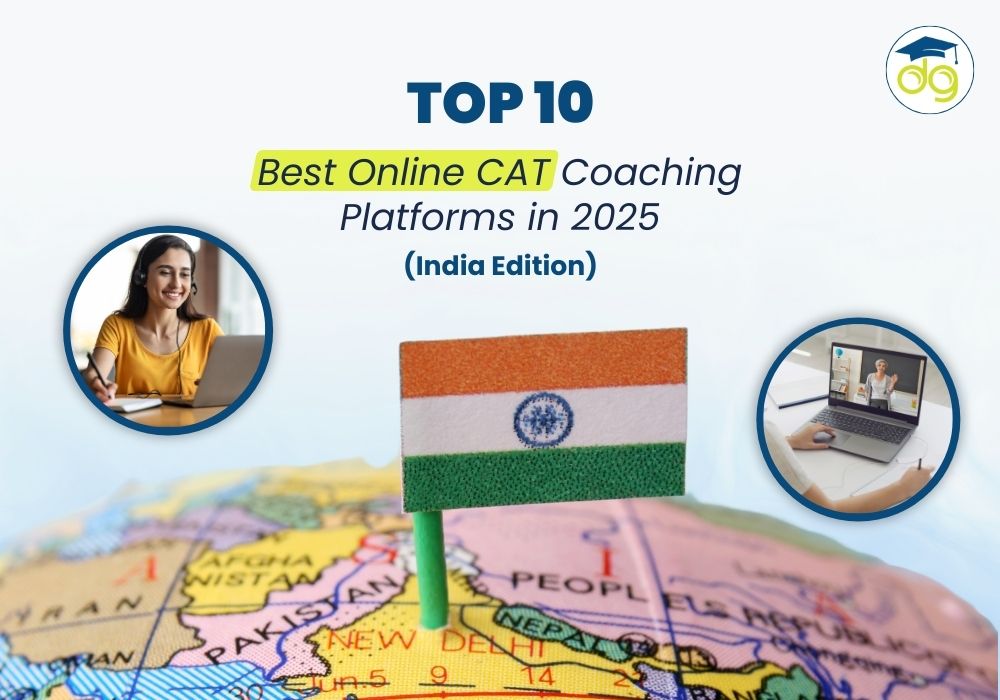CAT Exam vs GMAT: Which Test is Best for Your MBA Journey?
Compare CAT and GMAT for MBA in India or abroad with pros, cons, tips
Deciding between CAT and GMAT stands as a crucial decision for MBA aspirants. Both tests are constructed differently and are set for different aspirations. While the CAT is conducted for admission in Indian institutes, the GMAT is a globally acknowledged test, especially among foreign business schools. The differences between the two tests should be weighed in order to make an informed decision.
1. Overview of CAT and GMAT
CAT (Common Admission Test):
- Conducting Body: Indian Institutes of Management (IIMs)
- Frequency: Annually, typically in November
- Validity: 1 year
- Mode: Computer-based
- Sections:
- Verbal Ability and Reading Comprehension (VARC)
- Data Interpretation and Logical Reasoning (DILR)
- Quantitative Ability (QA)
- Total Questions: 66
- Duration: 2 hours (40 minutes per section)
- Scoring: +3 for correct answers, -1 for incorrect answers
- Eligibility: Bachelor's degree with a minimum percentage (varies by category)
GMAT (Graduate Management Admission Test):
- Conducting Body: Graduate Management Admission Council (GMAC)
- Frequency: Available year-round
- Validity: 5 years
- Mode: Computer-adaptive
- Sections:
- Analytical Writing Assessment (AWA)
- Integrated Reasoning (IR)
- Quantitative Reasoning
- Verbal Reasoning
- Total Questions: 80
- Duration: 3 hours 7 minutes
- Scoring: 200–800 scale
- Eligibility: Open to all; however, some business schools may have specific requirements
2. Syllabus Comparison
Section | CAT Syllabus 2025 | GMAT Syllabus 2025 |
| Quantitative Ability | Arithmetic, Algebra, Geometry, Numbers | Arithmetic, Algebra, Geometry, Word Problems |
| Verbal Ability | Reading Comprehension, Grammar, Vocabulary | Reading Comprehension, Sentence Correction, Critical Reasoning |
| Logical Reasoning | Puzzles, Seating Arrangement, Data Sufficiency | Data Sufficiency, Logical Puzzles, Critical Reasoning |
| Data Interpretation | Tables, Graphs, Caselets | Data Interpretation, Graphics Interpretation |
| Integrated Reasoning | Not applicable | Multi-Source Reasoning, Table Analysis |
| Analytical Writing | Not applicable | Analytical Writing Assessment |
3. Difficulty Level
CAT and GMAT are both competitive, but the nature of their difficulty differs. CAT is known for its unpredictable patterns, while GMAT follows a consistent, adaptive structure that tailors to test-taker ability.
CAT Difficulty:
- DILR is often the toughest section.
- Questions can vary significantly each year.
- Time pressure is very high across all sections.
- Quant section tests deep conceptual understanding.
- No sectional choices make the CAT rigid.
- Verbal requires reading stamina and logic.
- Negative marking adds pressure on accuracy.
GMAT Difficulty:
- Computer-adaptive format increases the challenge gradually.
- Mistakes in early questions lower your score.
- Quant is more structured but conceptually tight.
- The verbal section tests logic and grammar rules.
- Integrated Reasoning needs fast data analysis.
- Essay writing (AWA) requires clarity and structure.
- Requires consistent speed across all sections.
4. Eligibility Criteria
Understanding eligibility is essential before applying. While GMAT is open globally, CAT is primarily for Indian graduates aiming for MBA programs in India. Age is not a restriction for either test.
CAT Eligibility:
- Must hold a bachelor’s degree from a recognised university.
- Minimum 50% for General and 45% for reserved categories.
- Final-year students can also apply.
- No age limit.
- Valid for IIMs and several Indian B-schools.
GMAT Eligibility:
- No fixed qualification barrier from GMAC.
- Business schools may set specific criteria.
- Recommended for candidates above 18 years old.
- A passport is needed as ID proof.
- The score is valid for 5 years.
- Accepted in over 110+ countries
- Ideal for global MBA aspirants.
5. Score Comparison
CAT uses a percentile system to rank test-takers, while GMAT provides a raw score from 200 to 800. The scoring systems differ in purpose and how they reflect candidate performance.
CAT Percentile System:
- Scores depend on relative performance.
- 99+ percentile is usually needed for top IIMs.
- Each section has a sectional percentile.
- Percentile changes annually with test difficulty.
- No absolute benchmark for admission.
- Normalisation affects final results.
- Lower scores can still qualify for good B-schools.
GMAT Scoring System:
- Composite score between 200–800.
- Quant and Verbal scores contribute most.
- AWA is scored on a scale of 0–6.
- IR section scored on a scale of 1–8.
- The score report includes all sub-scores.
- 700+ score required for top global schools.
- You can select which score to send.
6. Coaching and Preparation
Both exams require strong conceptual knowledge and strategic preparation. The availability of quality coaching, books, and mock tests makes a big difference in exam readiness.
CAT Coaching Resources:
- TIME: Extensive classroom and online programs.
- IMS: Focused mock test series and analytics.
- Career Launcher: Personalised prep plans.
- 2IIM: Ideal for online learners.
- Cracku: Sectional tests and video lessons.
- Arun Sharma's books for QA and DILR.
- Norman Lewis for vocabulary building.
GMAT Coaching Resources:
- e-GMAT: Excellent for non-native English speakers.
- Magoosh: Affordable and flexible online plans.
- Manhattan Prep: Strong conceptual content.
- GMATWhiz: AI-based personalised learning.
- Official GMAT Guide (from GMAC).
- Kaplan and Princeton Review books.
- GMAT Club for peer support and doubt clearing.
7. Cost and Accessibility
CAT is relatively cheaper and is conducted annually in India. GMAT is costlier but provides flexibility in exam scheduling and multiple retake options, making it more globally accessible.
CAT Cost and Features:
- Exam fee: ₹2,400 (General), ₹1,200 (SC/ST).
- Conducted once a year in November.
- Registration opens around August.
- Centres are located in major Indian cities.
- Limited rescheduling or correction options.
- Score valid for 1 year.
- Low cost makes it widely accessible.
GMAT Cost and Features:
- Exam fee: $275 (~₹22,000).
- Retake is possible after 16 days.
- Can be taken 5 times/year.
- Online GMAT option available globally.
- The fee includes sending the score to 5 colleges.
- Rescheduling and cancellation are allowed (for a fee).
- Score valid for 5 years.
8. Which One Should You Choose?
Choosing CAT or GMAT depends on your academic background, career goals, and whether you’re targeting Indian or global B-schools. Each test has its own strengths and ideal candidates.
Choose CAT if:
- You aim to study in India.
- Your target is IIMS or top Indian institutes.
- You are comfortable with percentile-based selection.
- Your strengths lie in logical puzzles and math.
- You can manage intense exam-day pressure.
- You're looking for a more affordable exam.
- You prefer offline or classroom coaching options.
Choose GMAT if:
- You plan to apply to foreign universities.
- You want flexibility in choosing exam dates.
- You're targeting 1-year MBA or executive programs.
- You prefer structured and adaptive testing.
- You need score validity for multiple years.
- You're willing to invest in global exposure.
- You want to apply to both Indian and international B-schools.
How to Prepare for CAT
CAT preparation demands consistency, practice, and smart time management. Here’s how you can approach it:
Step-by-Step Preparation Plan:
- Understand the exam pattern and section-wise distribution.
- Strengthen your basics in Quant and English.
- Read newspapers, articles, and editorials daily to improve comprehension.
- Practice logical reasoning and data interpretation questions regularly.
- Take mock tests every week and analyse them in detail.
- Identify weak areas and spend extra time improving them.
- Manage time effectively across all three sections.
- Revise concepts and formulas every weekend.
Best Study Resources for CAT
Books:
- How to Prepare for Quantitative Aptitude for CAT – Arun Sharma
- Logical Reasoning and Data Interpretation – Nishit K. Sinha
- Word Power Made Easy – Norman Lewis
- How to Prepare for Verbal Ability and Reading Comprehension – Arun Sharma
Online Platforms:
- Unacademy CAT
- 2IIM CAT
- TIME Online Portal
- IMS CAT Coaching
- Cracku (concept videos, sectional mocks, full-length tests)
How to Prepare for GMAT
GMAT preparation is strategic and analytical. Since it’s a computer-adaptive test, timing and precision are key.
Preparation Strategy:
- Get familiar with the adaptive nature of the GMAT.
- Build strong foundations in Quant and Verbal.
- Practice essay writing and review your writing style.
- Learn to interpret graphs and tables for IR.
- Use the GMAT Official Guide to practice actual exam-style questions.
- Take timed mock exams to simulate real test pressure.
- Keep an error log and revise it regularly.
- Focus on accuracy along with speed.
Best Study Resources for GMAT
Books:
- GMAT Official Guide 2024
- Manhattan Prep GMAT Strategy Guides
- Kaplan GMAT Prep Plus
- Powerscore Critical Reasoning Bible
Online Courses:
- e-GMAT
- Magoosh GMAT
- GMATWhiz
- Manhattan Prep Online
- Target Test Prep
Mock Tests:
- GMAT Official Practice Exams (2 free from mba.com)
- Veritas Prep Test Series
- Kaplan Adaptive Mock Tests
Top Colleges Accepting CAT Score
IIMs (All 21):
- IIM Ahmedabad
- IIM Bangalore
- IIM Calcutta
- IIM Lucknow
- IIM Indore
- IIM Kozhikode
- All newer IIMs like IIM Udaipur, IIM Trichy, IIM Raipur, etc.
Other Top Indian B-Schools:
- Faculty of Management Studies (FMS), University
- SP Jain Institute of Management and Research (SPJIMR), Mumbai
- Management Development Institute (MDI), Gurgaon
- National Institute of Industrial Engineering (NITIE), Mumbai
- Department of Management Studies, IIT Delhi
- Shailesh J. Mehta School of Management, IIT Bombay
- Xavier Institute of Management, Bhubaneswar
- TAPMI, Manipal
- Great Lakes Institute of Management, Chennai
- Loyola Institute of Business Administration (LIBA), Chennai
Top Colleges Accepting GMAT Scores
Indian Colleges:
- Indian School of Business (ISB), Hyderabad and Mohali
- SPJIMR Mumbai (PGPM program)
- Great Lakes Institute of Management, Chennai
- XLRI Jamshedpur (for GMP)
- IMT Ghaziabad (executive programs)
- MDI Gurgaon (executive MBA)
International Colleges:
- Harvard Business School
- Stanford Graduate School of Business
- MIT Sloan School of Management
- Wharton School – University of Pennsylvania
- London Business School
- INSEAD, France and Singapore
- Columbia Business School
- University of Chicago – Booth School of Business
- Yale School of Management
- University of Cambridge – Judge Business School
- University of Oxford – Saïd Business School
- HEC Paris
- NYU Stern School of Business
Final Thoughts
Both CAT and GMAT hold their own prestige. Thus, the selection has to be based on one's career path,'s target institutions, and monetary factors. Visit Skoodos Bridge for all the preparation material and guidance you could need.
FAQs
Can I prepare for the CAT and GMAT simultaneously?
Yes, but it would need stellar planning because of points of syllabus overlap and contrasts.
Which one is more accepted worldwide?
GMAT is more accepted by international B-schools.
Is there a significant difference in fees?
Yes, the GMAT is much costlier than the CAT.
Which one is more difficult?
Both are challenging, though in very different ways- CAT is unpredictable, whereas the GMAT, being an adaptive test, consistently challenges the examinees.
Can I get admission abroad with the CAT?
Generally, international B-schools do not accept CAT scores; GMAT scores are preferred instead.
Categories
Archives
Similar Posts


CAT Exam vs GMAT: Which Test is Best for Your MBA Journey?
by Skoodos Bridge


Crack Any Exam with Pomodoro & Smart Study Techniques in 2025
by Skoodos Bridge

CAT 2025 Syllabus: Section-Wise Topics, Tips & Weekly Plan
by Skoodos Bridge

Top 10 Best Online CAT Coaching Platforms in India for 2025
by Skoodos Bridge





Leave a Comment